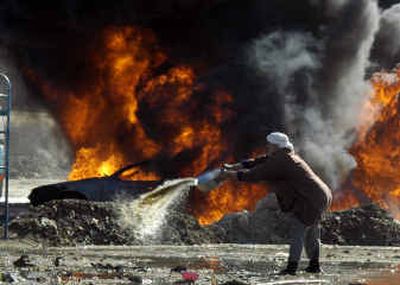Three foreigners killed in attack in northern Iraq

BAGHDAD, Iraq – Insurgents killed at least three foreigners on Friday in Mosul, a northern city that became a stronghold after Fallujah fell to U.S. and Iraqi forces. Militants also set ablaze a pipeline near the capital – a rare attack on oil infrastructure in a populated area.
The U.S. Embassy confirmed the name of an American contractor taken hostage six weeks ago in Baghdad – a man who has not been seen or heard from since – identifying him as Roy Hallums, a 56-year-old worker for a Saudi company that does catering for the Iraqi army.
His wife, Susan Hallums of Corona, Calif., said in a telephone interview Friday that she has not heard from the kidnappers.
“I want to plead for his life and send out prayers and hope that he will be released,” said Hallums, who is separated from her husband, the father of their two daughters.
The continuing bloodshed has dissuaded Iraq’s political parties and coalitions from organizing public rallies ahead of the country’s Jan. 30 parliamentary elections, the first free vote since the overthrow of the monarchy 45 years ago.
The violence has been so widespread that preparations for the election have barely begun in the three central provinces that include Baghdad, Mosul and the battleground cities of Ramadi and Fallujah.
Although the election campaign officially kicked off Wednesday, so far only the Iraqi Communist Party — which is part of the U.S.-installed interim government – was known to have held a public gathering.
Also Friday, a government official said that Saddam Hussein’s defense minister, who surrendered to U.S. forces last year, will join another notorious general – known as Chemical Ali – in the dock when judicial proceedings against top figures of the Baathist regime open next week.
Gen. Sultan Hashim Ahmad gave himself up in September 2003 at a coalition military base in Mosul. He was not considered to be a war crimes suspect and many had expected that he would be freed after being questioned.
In contrast, Ali Hassan al-Majid, who earned the nickname Chemical Ali after using poison gas to kill thousands of Kurds in the 1980s, is considered a leading defendant.
In Mosul, third-largest city with over 1 million inhabitants, attackers ambushed a car and killed all four of its occupants. The bodies of the four men, including one whose head was almost severed, were seen lying on the road alongside their burning car.
Police Capt. Zeid Waseem said police received reports that three of the dead were foreigners but their nationalities were not immediately known.
However, Turkey’s Foreign Ministry said in a statement that a group of Turkish Embassy guards, on their way from Turkey to Baghdad, came under a terrorist attack in Mosul and that several were killed or wounded. It could not immediately be confirmed if the embassy guards were the people ambushed in the car.
South of Baghdad, an explosion and fire on an oil pipeline near the capital’s Dora refinery sent thick black billowing smoke pouring into the sky.
U.S. troops sealed off the area. Insurgents regularly attack the country’s oil infrastructure, but they usually pick remote desert locations.
Hallums, the American hostage who was identified Friday, was seized in an attack Nov. 1 after a gunbattle in which an Iraqi guard and one attacker were killed.
Hallums, Filipino accountant Robert Tarongoy, a Nepalese worker, Inus Dewari, and three Iraqis employed by the Riyadh-based Saudi Arabian Trading and Construction Company were taken away after the gunfight. The Iraqi hostages and the Nepalese were freed later.